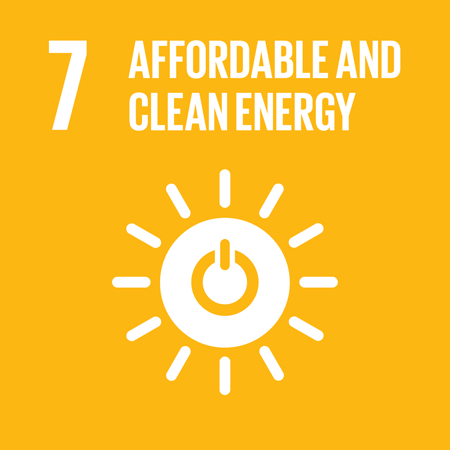
SDG 7: AFFORDABLE AND CLEAN ENERGY
In addition to water and food, energy is one of the main supports for the survival of humans and other living things. Energy is at the center of every great activity, challenge and opportunity facing the world today.
Energy must be available and affordable for all to enable long-term development, and it must be clean to ensure sustainable development.
University measures towards affordable and clean energy
- Energy-efficient renovation and building
- Upgrade buildings to higher energy efficiency
- Carbon reduction & emission reduction process
- Plan to reduce energy consumption
- Energy wastage identification
- Divestment policy
Padjadjaran University has a policy to ensure all renovations or new buildings follow energy efficiency standards.
Rector Regulation Energy Conservation Development Program at Unpad
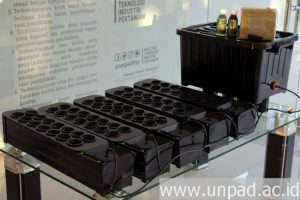
1. FTIP Unpad Lecturers and Students Develop Smart Hydroponic Devices
Padjadjaran University developed a hydroponic device using the principle of a self-watering system without electrical energy. The device called “Smart Watering” was developed by an FTIP Unpad lecturer with five FTIP students. The use of electricity, especially for water management in hydroponics, is quite high. That’s why Smart Watering is here to solve this problem. Smart Watering can be used for various types of plants and hydroponic methods, such as substrates and water culture. In addition to saving electricity, the use of Smart Watering is also believed to increase efficiency in the use of water and nutrients.
( FTIP Unpad Lecturers and Students Develop Smart Hydroponic Devices )
Have plans to upgrade existing buildings to higher energy efficiency.
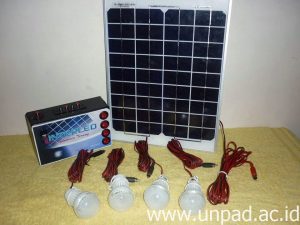
1. Unpad “Smart Watering” Innovation Won 2nd Winner of KMI Awards
The student team of the Faculty of Agricultural Industrial Technology (FTIP) Universitas Padjadjaran won 2nd Place in the Indonesian Student Entrepreneurship (KMI) Awards for the KBMI Category, Technology Industry Sub Category. “Smart Watering” is a smart hydroponic device that uses the principle of a self-watering system without electrical energy. This product utilizes the force of gravity, Archimedes principle, and capillarity. In addition to saving electricity, the use of Smart Watering is also believed to increase efficiency in the use of water and nutrients. This product can minimize the evaporation process from the growing media, so that 100% of the water and nutrients will be absorbed by the plants.
( IUnpad “Smart Watering” Innovation Won 2nd Winner of KMI Awards )
2. Solahen, Remote Area Electricity Solution by Unpad Students
Almost 72 years of Indonesia’s independence, there are still many areas that have not been reached by electricity. The difficulty of access and the average contour of the area are the reasons why the electricity supply is not evenly distributed in Indonesia. Electricity is a basic need of society in carrying out daily activities. This condition aroused a group of Management students from the Faculty of Economics and Business, Padjadjaran University. They developed a simple and self-contained power supply system using solar panels as their energy source. This simple home power generation system is named “Solahen” (Energy Saving Lighting Solution). Technically, Solahen utilizes solar energy to convert it into solar panels. The energy is then stored in the battery and channeled into the house lights. The system is made simple so that people can do the installation easily, even by any age group.
( Solahen, Remote Area Electricity Solution by Unpad Students )
Have processes for carbon management and reduce carbon dioxide emissions.
1. Towards a Sustainable Dream Forest
Forests are strategic natural resources as the largest contributor of O2 to all life on earth, and Indonesia is a country that has the third largest tropical rain forest after Brazil and Congo. Protected forest fires have occurred again in the Gunung Geulis area, Kab. Sumedang ravaged three village areas including Jatimukti Village, Cisempur Village, and Jatiroke Village. Based on a statement from one of the residents, the trigger for the fire was caused by the negligence of the farmer who was burning garbage on the mountain. This is exacerbated by the low level of public awareness that is not sensitive to the environment. The benefits that can be given in greening Indonesia are that it can provide welfare for the community. It is known from research results that forests can reduce the amount of carbon footprint in nature. Where the average Indonesian annually emits a Carbon footprint of 1.8 tons/year. With the carbon absorption capacity of teak trees alone, the concentration of Carbon footprint can be absorbed up to 190 kg/tree/year. This means that only by planting 10 trees/person can help nature in absorbing carbon to absorb the footprint that is issued. Therefore, it is necessary to pioneer a zero carbon footprint community, as an association of the earth’s reforestation movement in suppressing carbon that causes global warming on earth. Now is the time to reforest the country with our strength, we don’t need to wait to reforest our homeland. We ourselves can work together to achieve our goals.
Have an energy efficiency plan to reduce overall energy consumption.
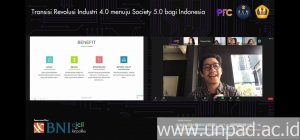
1. BEM FISIP Unpad Held “Padjadjaran Fest & Conference 2020”
The Scientific Department of the Student Executive Board (BEM) of FISIP Universitas Padjadjaran held a virtual “Padjadjaran Fest and Conference (PFC)” on November 20-22. The event, which was attended by more than 300 participants from various universities in Indonesia, consisted of three series of activities, including debates, essay conferences, and webinars. This year, PFC carries the theme “Transition of the Industrial Revolution 4.0 Towards Society 5.0 for Indonesia”. Meanwhile, the debate competition raised discussions about the industrial revolution 4.0 as well as an essay conference that discussed the role of artificial intelligence and big data in developing environmentally friendly energy for the community. The PFC webinar event presented an influencer from the millennial circle, namely Reza Fahlevi who discussed personal branding and Unpad Faculty of Animal Husbandry Lecturer Dr. Muhammad Fatah Wiyatna who discussed the potential of renewable energy in Indonesia.
( BEM FISIP Unpad Held “Padjadjaran Fest & Conference 2020” )
2. Plan to reduce consumption
( Plan to reduce energy consumption )
3. Commemorating Earth Hour, Unpad Invites Campus Community to Contemplate Take Care of the Earth
Padjadjaran University held an “Earth Hour Contemplation Unpad” activity. The theme raised is New Renewable Energy for the Benefit of Humanity. Prof. Hendarmawan said that the energy available in this earth must provide peace and security for mankind. If you look around Unpad itself, there is a lot of energy that can be utilized. Mount Manglayang, which is located close to the Unpad campus, has geothermal potential that can be used as new renewable energy for the surrounding community. This Earth Hour commemoration is a form of energy saving and a form of saving the earth for the better.
( Commemorating Earth Hour, Unpad Invites Campus Community to Contemplate Take Care of the Earth )
4. Healthy and Environmentally Friendly Padjadjaran Program Begins to Roll
In order to improve the health level of the academic community, Padjadjaran University held a program “Healthy and Environmentally Friendly Padjadjaran”. This program will also promote various programs, including energy-saving campaigns, prohibition of smoking in the campus environment, walking, to the program to dispose of garbage in its place. It is hoped that this program can continue and be practiced by all Unpad academics.
( Healthy and Environmentally Friendly Padjadjaran Program Begins to Roll )
Undergo energy reviews to identify areas where energy waste is highest.

1. Green Economy (Sustainable Cities, Renewable Energy)
Padjadjaran University pays attention to the green economy such as a sustainable city, renewable energy so that it can save the environment from wasting energy. The ever-increasing waste of energy makes the earth hot, so action must be taken to save the earth.
Has a policy of divesting investment from the carbon-intensive energy industry, especially coal and oil.

1. Unpad and BPH Migas Agree on Cooperation to Realize National Energy Security
In order to realize the commitment and contribution to the nation’s development, particularly related to national energy security, Universitas Padjadjaran cooperates with the Downstream Oil and Gas Regulatory Agency (BPH Migas). This cooperation is expected to maximize the utilization of available resources in each institution for the national interest. Meanwhile, the Dean of the Faculty of Law Unpad said that this collaboration generally aims to solve various national problems related to downstream oil and gas activities. Some of the studies that will be carried out include drafting dispute resolution regulations and studies on the joint use of fuel transportation and storage facilities.
( Unpad and BPH Migas Agree on Cooperation to Realize National Energy Security )
2. Energy in the Low-Carbon Economy Era: Government Commitment Is Not Enough
The Faculty of Economics and Business Universitas Padjadjaran held a public lecture entitled “Energy Investment in Indonesia in the Low-Carbon Economy Era: The Challenges and Opportunities”. In addition to public lectures, this activity also featured panel discussions with panelists, namely the Director of BP Indonesia, Moektianto Soeryowibowo, Representative of the Ministry of Energy and Mineral Resources, Hariyanto from the Directorate of Various New Energy and Renewable Energy, Yayan Satyaki, lecturers and researchers at FEB Unpad and Theresia Betty Sumarno, researcher at Center for Energy, Petroleum, and Mineral Law & Policy, University of Dundee.
( Energy in the Low-Carbon Economy Era: Government Commitment Is Not Enough )
3. Abdul Hamid Batubara, “Indonesia is in an Energy Crisis Condition”
Several factors have made Indonesia currently entering a state of energy crisis. Apart from the limited discoveries of new fields, the conditions of the rule of law and also the political situation have a significant influence on the creation of an energy crisis in our country. The condition of the energy crisis in Indonesia, one of which is caused by the production process being hampered due to the high cost of researching new fields that do not necessarily produce oil. In addition, especially in Indonesia, the regulatory conditions that are quite hindering companies from operating have a role in the energy crisis. Efforts can be made to increase the depleting energy reserves. These include new discoveries through exploration, increased oil and gas recovery from existing fields through technological updates, increased efficiency of existing wells with workovers, pump repairs, improvement of facilities as well as further development and application of more diverse techniques.
( Abdul Hamid Batubara, “Indonesia is in an Energy Crisis Condition” )
Energy usage per sqm
Total energy used in Gigajoule (GJ)
Floor space of the university buildings in square metre (m2)
Energy and the community
- local community outreach for energy efficiency
- 100% renewable energy pledge
- Energy efficiency services for industry
- Policy development for clean energy technology
- Assistance to low-carbon innovation
Provide programs for local communities to learn about the importance of energy efficiency and clean energy.
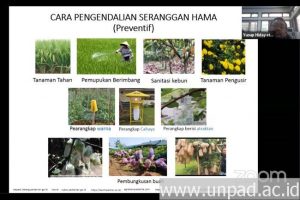
1. Vegetable Pesticides, Easy and Cheap Pest Control
As an alternative to insect pest control, the use of botanical pesticides is considered safe to use. The manufacturing process is not difficult. This pesticide is made using raw materials that are easily found. Furthermore, Yusup said, plants that have the potential to be used as pesticide ingredients include strong aroma, bitter taste, insect pests dislike, and can be used as medicinal plants. A number of plants can be used as raw materials for vegetable pesticides such as papaya leaves, brotowali, garlic, neem, kipait, saliara, suren, and jatropha. The process of making plant-based pesticides is cheap and easy. Plant-based pesticides are also safe for humans and the environment, including not poisoning plants.
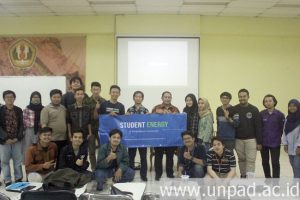
1. Student Energy Organization, Encourages Students to be Aware of New Renewable Energy
As a means of education, especially to students regarding the role that educational institutions can play in solving energy problems, Student Energy Universitas Padjadjaran held a “Renewable Energy Talk (RE-Talk)”. Developing environmentally friendly energy is not only the task of the government. There needs to be a role from various parties, one of which is educational institutions. Student Energy itself is a non-governmental organization engaged in the energy sector. The goal is to help accelerate the energy transition towards sustainable energy management. One of the programs carried out by Student Energy Unpad this year is the development of an electric bicycle called “Easy Bike”. At this time Easy Bike is in the prototype stage. In addition, the development of a charging station is also carried out in collaboration with PRINT-G Universitas Padjadjaran and integrated with solar energy sources.
( Student Energy Organization, Encourages Students to be Aware of New Renewable Energy )
Provide direct services to local industry aimed at improving energy efficiency and clean energy (energy efficiency assessments, workshops, research on renewable energy options)

1. DC Electricity Future Home Solution
Director of the Electric Power Institute Cal Poly State University, United States, Prof. Dr. Taufik said that future homes should no longer depend on AC (alternating current) electricity networks. The electricity grid in the home of the future could combine hybrid technology. Prof. Taufik explained that DC power grid technology in the house is an alternative to overcome the AC power load at home. Moreover, currently many household products use DC power grids. He gave an example of the use of LED lights at home. Technically, LED lights use DC technology. Thus, it will be inefficient if the lamp with DC network must be installed in the AC network, because the DC power source will automatically be converted back to AC. Therefore, the house in the future should be made with a combination of AC and DC electricity networks. Prof. Taufik also said that Indonesia has the potential to have a future home that develops hybrid technology like this.
( DC Electricity Future Home Solution DC )
2. Dr. eng. I Made Joni, MSc, “Nano Technology Can Overcome This Nation’s Energy Crisis”
The energy crisis that hit Indonesia is a shared responsibility. Taking action to save energy and looking for alternative energy sources is urgent to be done. “By utilizing nanotechnology, the problem of the energy crisis can be overcome. Why? Because nanotechnology can be applied to all sectors of the super energy chain, including energy sources, energy conversion, energy distribution, energy storage and energy utilization,” said I Made. I Made Joni explained that the use of nano technology in the energy sector is quite a lot, including super conductors for motors, dye solar cells, and polymer solar cells. In addition, he also explained that using this technology can improve or make the performance of a tool more optimal. This discovery has been successful and has been tested on a boat engine assisted by PT. Grafindo Nusantara. The current stage is manufacturing, designing as complex as possible the appearance of the battery and the design of a boat that all have electrodes to charge the battery.
( Dr. eng. I Made Joni, MSc, “Nano Technology Can Overcome This Nation’s Energy Crisis” )
3. Regulate Water Efficiency, Unpad Agricultural Researcher Produces Self Watering Fertigation System Technology
Facing global climate change, the agricultural sector needs to have a system that can regulate water efficiency. One of the teams led by Professor of the Faculty of Agricultural Industrial Technology (FTIP) Unpad, Prof. Dr. Hj. Nur has chosen Bafdal, Ir., M.Sc., invented the Self Watering Fertigation System technology. This technology is an automatic water supply system without using electrical energy. This system drains rainwater from gutters on the roof of the greenhouse to be accommodated in two storage drums. Each drum has a capacity of 5,300 liters. The water from the drum has then flowed into 3 small drums in the greenhouse. The water in the small drum is then mixed with fertilizer. Furthermore, the mixed water has then flowed automatically to the plant pot. The type of plant pot used is an autopot.
Inform and support the government in the development of clean energy policies and energy-saving technologies.
Policy of Management of Eco-Friendly Campus
1. Supporting Green Campus, Three Unpad Students Initiate Solar Electric Bike
Three Padjadjaran University students developed the idea of a solar-powered electric bicycle. Using energy from the sun, the bicycle, which is named the “Easy Bike”, is believed to be more environmentally friendly than other electric bicycles currently on the market. Because they utilize solar energy, they also have the idea to place several charging stations or charging stations in the campus environment. They have also made a prototype of an electric bicycle along with its charging station. The manufacture of this prototype also involved support from FMIPA Unpad and the Research Center for Nanotechnology and Graphene (Print-G). In the future, Easy Bike will continue to be refined and is expected to be implemented on the Unpad campus. Apart from being environmentally friendly, Mutiara revealed that Easy Bike also has access to Radio Frequency Identification (RFID), and has GPS and calorie counter facilities.
( Supporting Green Campus, Three Unpad Students Initiate Solar Electric Bike )
Provide assistance to startups that promote and support low-carbon economies or technologies.

1. Unpad Students Initiate Eco-Friendly Plastic Idea to Wrap Covid-19 Corpses
The process of repatriating the bodies of Covid-19 patients applies strict health protocols. One of them is to wrap it in plastic to prevent no liquid coming out of the corpse. Unfortunately, this is a separate problem for environmental sustainability. To deal with this, three students of the Faculty of Pharmacy, Universitas Padjadjaran, Adira Rahmawaty, Muhammad Ilfadry Rifasta, and Salsa Sagitasa, developed the idea of environmentally friendly (biodegradable) plastic from cassava starch to wrap the bodies of Covid-19 patients. Cassava starch plastic will decompose within 12 days for a size of 1 millimeter. If the assumption of the use of plastic to wrap the corpse is 2 square meters, the time required to decompose in the soil is only 6 months. Based on the idea of Adira and his team, making cassava starch plastic for Covid-19 body wraps is almost the same as making environmentally friendly plastic in general. Cassava starch is mixed with a number of chitosan compositions as a plasticizer. Therefore, Adira and his team came up with the idea to add additives to cover the weakness of environmentally friendly plastic. Additional substances used in the composition of chitosan include glycerol, sorbitol, aloe vera, and cinnamon oil.
( Unpad Students Initiate Eco-Friendly Plastic Idea to Wrap Covid-19 Corpses )
